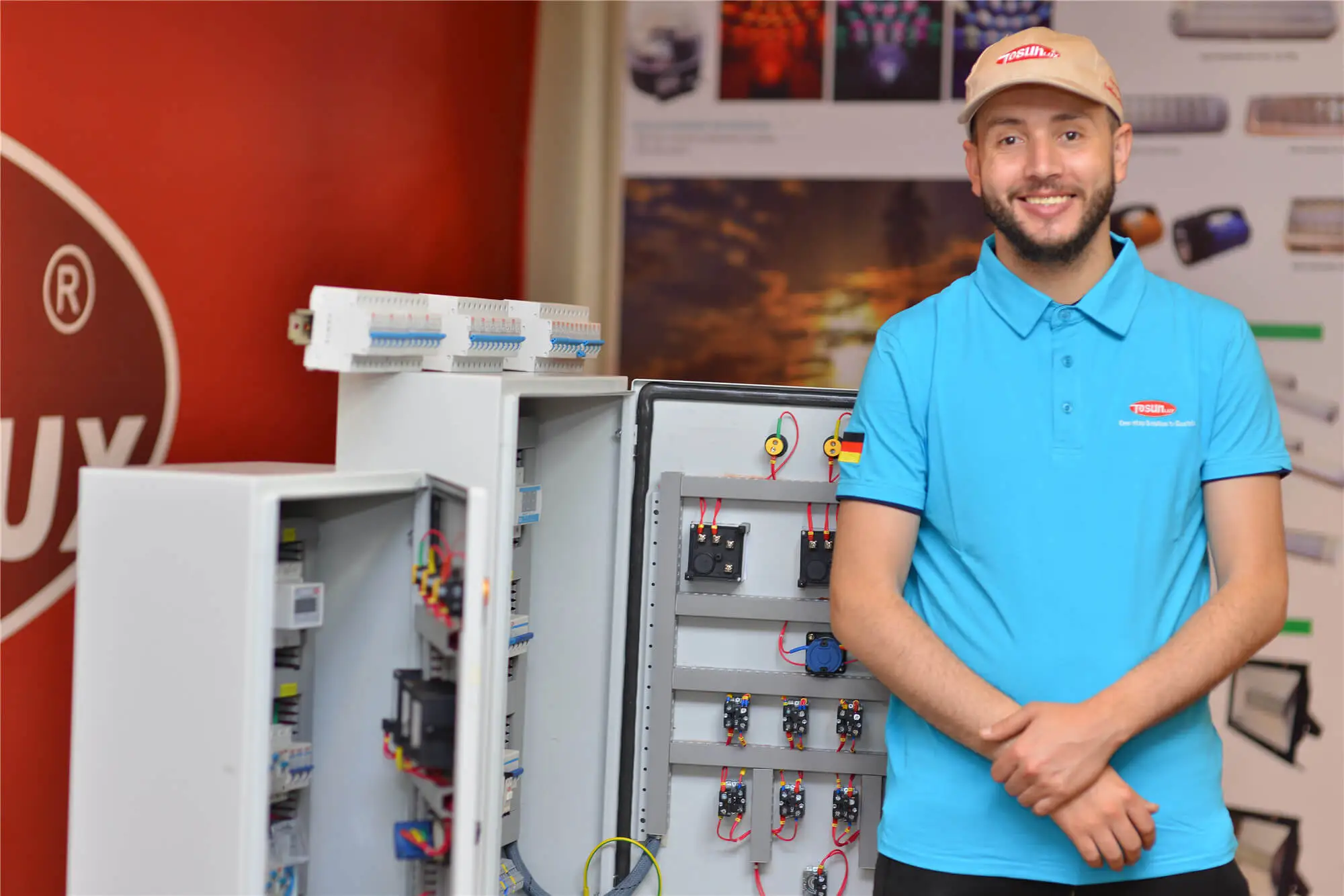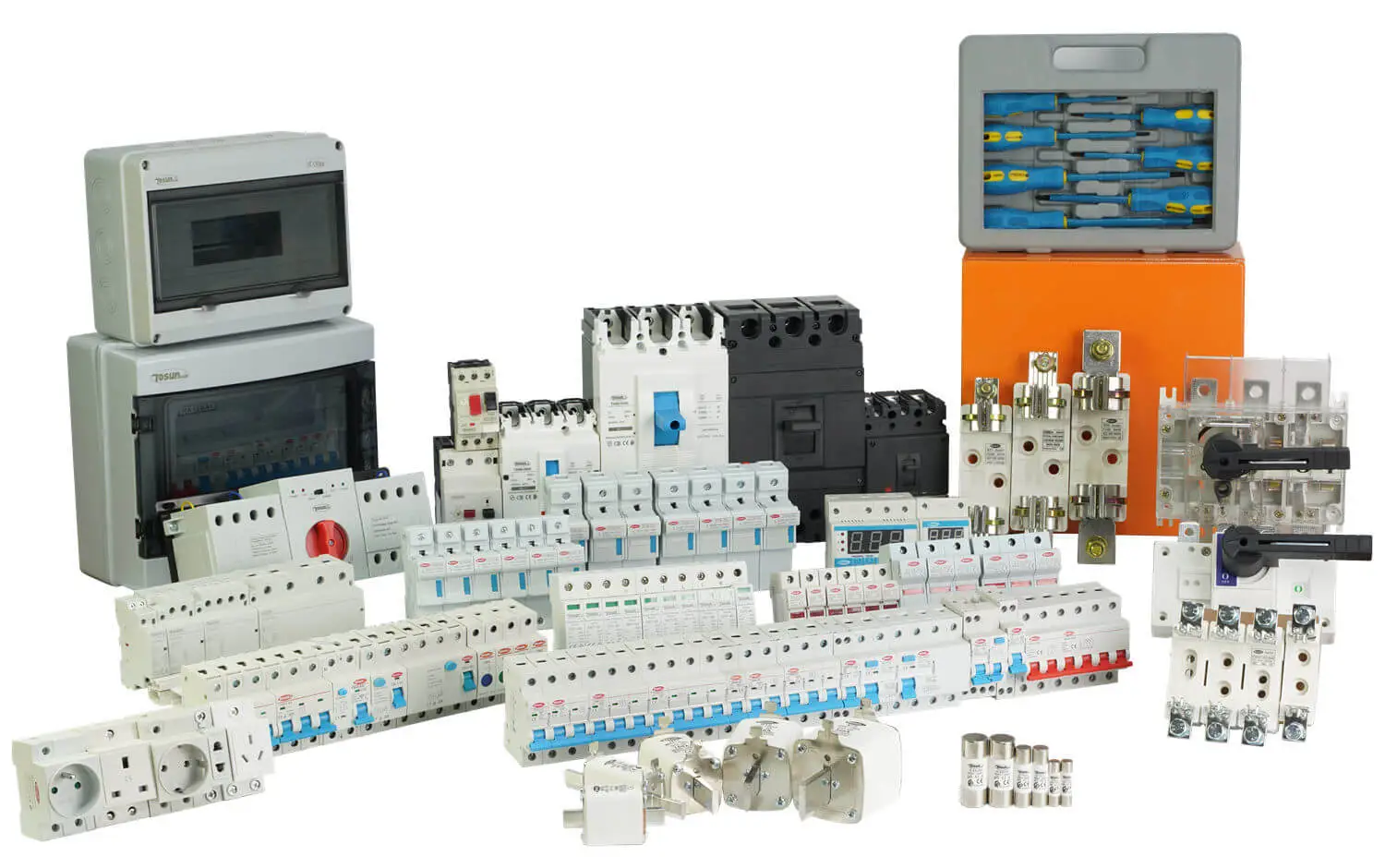One-Stop Solution To Electric
With its innovative features and exceptional performance, the Tosunlux Solar PV Fuse stands out as an indispensable component for any solar energy project.
Home » Solar Pv Fuse
With its innovative features and exceptional performance, the Tosunlux Solar PV Fuse stands out as an indispensable component for any solar energy project.
Home » Solar Pv Fuse
The TOSUNlux Solar PV Fuse is engineered to meet the unique demands of solar installations. It is designed to protect both the solar panels and the associated electrical components, such as inverters and battery storage systems.
These photovoltaic fuses are built to withstand harsh environmental conditions, including temperature variations, humidity, and exposure to ultraviolet (UV) radiation.Operates flawlessly in temperatures ranging from -5°C to +40°C, and humidity levels below 90%, making it suitable for diverse environmental conditions.
Trust TOSUNlux Solar PV Fuse to safeguard your solar investments with unmatched durability and peace of mind. Experience the pinnacle of safety and performance for your photovoltaic systems today.
TOSUNlux prioritizes customer satisfaction and offers comprehensive customer support. Whether you need technical assistance, have questions about product installation, or require after-sales support, their team is there to assist you.
We have agents of the TOSUNlux brand appointed in 51 countries such as Morocco, Malta, Portugal, Cyprus, Oman, Ukraine, Zimbabwe, Dominican Republic, Venezuela, Chile, and Myanmar. This makes it easier for you to access our products and services.
Our products at TOSUNlux have various certificates such as CE, CB, TUV, and RoHS. These certificates ensure that our products meet international standards and are safe for your use.
As the solar industry aligns with sustainability goals, TOSUNlux shares this commitment. Their products contribute to the production of clean, renewable energy, supporting a more sustainable and environmentally friendly future.
TOSUNlux products are suitable for a wide range of solar installations, from small residential systems to large utility-scale projects. Their scalability means you can rely on their solutions regardless of the size of your solar project.
TOSUNlux understands the importance of cost-effective solutions in the solar industry. Their products are competitively priced, helping you maximize the return on investment for your solar system.

About TOSUNlux
TOSUNlux is specialized in manufacturing and supplying low voltage electrical products and lighting products, providing reliable products and one-stop solutions to customers worldwide.
TOSUNlux offers a full range of safe and reliable solutions for electrical distribution, including circuit breakers, isolating switches, pv fuse, enclosures, panel boards, and switchboards.
Quality and Certification
We’re Here To
All Your Questions
Here are some frequently asked questions about solar photovoltaic fuse:
Fuses used in solar panel systems are typically referred to as Solar PV (Photovoltaic) Fuses.
Here are some key considerations when choosing fuses for solar panels:
Voltage & Current: Match fuse voltage to your solar system’s voltage. Choose a current rating slightly higher than your maximum expected current.
Fast-Acting: Opt for fast or ultra-fast-acting fuses to prevent overcurrent damage promptly.
Location & Compliance: Install fuses as per system design, considering environmental factors. Ensure compliance with safety standards.
Professional Advice: Consult a qualified installer or electrician for proper fuse selection and system safety.
It’s important to consult with a qualified solar installer or electrician who is knowledgeable about solar PV systems when selecting and installing fuses for your solar panels. They can help you choose the right fuses and ensure that your system is safe and compliant with relevant regulations.
A solar fuse is a device that electricians use to protect solar circuits against excessive currents, also called overcurrents. The primary reason for using photovoltaic fuses is to prevent the wiring from becoming too hot (due to fault currents) and causing a fire. Here are some reasons why you should use a solar fuse:
Protection against overcurrent conditions: A solar fuse provides protection against overcurrent conditions, which helps prevent fires or damage to electrical components.
Prevents damage to devices: Fuses are used to protect devices from catching fire or from becoming more seriously damaged if there is a short circuit.
Required by code: The National Electric Code (NEC) requires that solar arrays having higher current availability than the maximum overcurrent protective device rating specified for the panel shall be protected from overcurrent.
Prevents nuisance blows: Using the correct fuse has the ability to stop a lot more current, a genuine concern for lithium chemistry batteries. Breakers (especially the smaller ones) can experience nuisance blows under normal operating conditions.
Solar PV fuses are important components of a solar PV system that protect the system wiring and devices from damage due to overcurrent or short circuits. Here are some key points to understand how solar PV fuses work:
A fuse is a two-terminal device that is placed in series with the circuit it is supposed to protect. It performs its function by melting itself out when the current tries to exceed the specified level, thus breaking the circuit open. Once operated (fused) it must be replaced.
Fuses can be described with several different characteristics, but the most important three are the operating voltage, the braking current, and the voltage range at which the fuse can safely operate.
If the short circuit current of the solar array is less than the maximum series fuse rating of the solar panel, the array does not need to be fused. However, if the solar array has higher current availability than the maximum overcurrent protective device rating specified for the panel, it shall be protected from overcurrent.
Fuses are mainly of two types: fast-reacting fuses and slow-blow or time delay fuses. Ordinary fuses are of the former type while quick-acting fuses are used to protect sensitive circuits which cannot tolerate even a temporary overload. Slow-blow or time-delay fuses are meant to ignore sharp surges in current, such as the in-rush currents at the start of a motor.
Get a quote now!
TOSUNlux maintains a profound grasp of the ever-changing market dynamics and works closely with our valued distributors to provide exceptionally high-quality customer service.
Application
The application of Solar PV (Photovoltaic) fuses is to protect various components within a solar energy system, including solar panels, inverters, batteries, and electrical circuits, from overcurrent conditions and other electrical faults. These fuses are critical to ensuring the safety, longevity, and efficiency of solar installations, whether they are small residential systems or large-scale commercial or utility projects.
More Reliable Solution To Electric
TOSUNlux has its own design team with a 5-people in-house design team, which provides 4-5 new series of products every year for our clients.

A solar PV fuse is a device that is used to protect the system wiring from getting too hot and catching fire, and to protect devices from catching fire or from becoming more seriously damaged if there is a short circuit. Here are some tips about solar PV fuses:
1. Fuses and circuit breakers are primarily used to protect the system wiring from getting too hot and catching fire, and to protect devices from catching fire or from becoming more seriously damaged if there is a short circuit.
2. Solar PV fuses are mainly of two types: fast-reacting fuses and slow-blow or time delay fuses. Ordinary fuses are of the former type while quick-acting fuses are used to protect sensitive circuits which cannot tolerate even a temporary overload. Slow-blow or time-delay fuses are meant to ignore sharp surges in current, such as the in-rush currents at the start of a motor.
3. In a parallel system, a combiner box is used that holds the fuses/breakers to each panel, plus one or more “combined” fuses leading to the charge.
4. If the short circuit current of the solar array is less than the maximum series fuse rating of the solar panel, the array does not need to be fused. However, if the solar array has higher current availability than the maximum overcurrent protective device rating specified for the panel, it shall be protected from overcurrent.
5. There are three different locations that are recommended for installing fuses or breakers: first, between the charge controller and battery bank, second, between the charge controller and solar panels, and third, between the battery bank and inverter.
6. The size of the fuse depends on the specific requirements of the system. For example, in the case of panels in parallel, a 30-amp fuse is required for each panel. Commercially made solar panels over 50 watts have 10 gauge wires capable of handling up to 30 amps of current flow.
In summary, solar PV fuses are important components of a solar PV system that protect the system wiring and devices from damage due to overcurrent or short circuits. The type of fuse used depends on the specific requirements of the system, and there are different locations where fuses or breakers can be installed.
Share this Blog
Tel: +86-577-88671000
E-mail: ceo@tosun.com
Skype: tosunelectric
Wechat: +86-139 6881 9286
WhatsApp: +86-139 0587 7291
Address: Room No.1001 Wenzhou Fortune Center,Station Road, Wenzhou, China
WhatsApp us